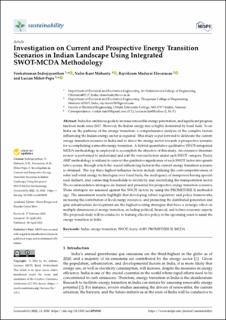| dc.contributor.author | Indrajayanthan, Venkatraman | |
| dc.contributor.author | Mohanty, Nalin Kant | |
| dc.contributor.author | Elavarasan, Rajvikram Madurai | |
| dc.contributor.author | Mihet-Popa, Lucian | |
| dc.date.accessioned | 2022-04-27T11:01:47Z | |
| dc.date.available | 2022-04-27T11:01:47Z | |
| dc.date.created | 2022-04-18T09:52:57Z | |
| dc.date.issued | 2022 | |
| dc.identifier.citation | Sustainability. 2022, 14 (9), Artikkel 4940. | en_US |
| dc.identifier.issn | 2071-1050 | |
| dc.identifier.uri | https://hdl.handle.net/11250/2993006 | |
| dc.description.abstract | India has ambitious goals to increase renewable energy penetration and significant progress have been made since 2017. However, the Indian energy mix is highly dominated by fossil fuels. To set India in the pathway of the energy transition, a comprehensive analysis of complex factors influencing the Indian energy sector is required. This study is put forward to delineate the current scenario of energy transition in India and to direct the energy sector towards a prospective scenario for accomplishing a smooth energy transition. A hybrid quantitative-qualitative SWOT integrated MCDA methodology is employed to accomplish the objective of this study. An extensive literature review is performed to understand and sort the various factors under each SWOT category. Fuzzy AHP methodology is utilized to convert the qualitative significance of each SWOT factor into quantitative scores through which the crucial influencing factor in the current energy transition scenario is obtained. The top three highest influencing factors include utilizing the cost-competitiveness of solar and wind energy technologies over fossil fuels, the inadequacy of manpower having specialized skillsets, and connecting households to electricity and electrifying the transportation sector. The recommendation strategies are framed and presented for prospective energy transition scenario. These strategies are assessed against the SWOT factors by using the PROMETHEE II methodology. The assessment results highlight that developing robust regulatory and policy frameworks, increasing the contribution of local energy resources, and promoting the distributed generation and grid infrastructure development are the highest scoring strategies that have a synergic effect on multiple dimensions of energy transition including political, financial and techno-economic aspects. The proposed study will be conducive to framing effective policy in the upcoming years to assist the energy transition in India. | en_US |
| dc.language.iso | eng | en_US |
| dc.publisher | MDPI | en_US |
| dc.rights | Navngivelse 4.0 Internasjonal | * |
| dc.rights.uri | http://creativecommons.org/licenses/by/4.0/deed.no | * |
| dc.subject | India | en_US |
| dc.subject | energy transition | en_US |
| dc.subject | SWOT | en_US |
| dc.subject | fuzzy AHP | en_US |
| dc.subject | PROMETHEE II | en_US |
| dc.subject | MCDA | en_US |
| dc.title | Investigation on current and prospective energy transition scenarios in indian landscape using integrated SWOT-MCDA methodology | en_US |
| dc.type | Peer reviewed | en_US |
| dc.type | Journal article | en_US |
| dc.description.version | publishedVersion | en_US |
| dc.rights.holder | © 2022 by the authors. | en_US |
| dc.subject.nsi | VDP::Teknologi: 500::Elektrotekniske fag: 540 | en_US |
| dc.source.volume | 14 | en_US |
| dc.source.journal | Sustainability | en_US |
| dc.source.issue | 9 | en_US |
| dc.identifier.doi | https://doi.org/10.3390/su14094940 | |
| dc.identifier.cristin | 2017396 | |
| dc.source.articlenumber | 4940 | en_US |
| cristin.ispublished | true | |
| cristin.fulltext | original | |
| cristin.qualitycode | 1 | |

